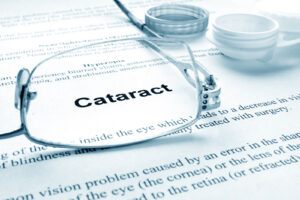Deciding on Cataract Surgery

When poor vision interferes with your lifestyle activities such as driving, watching television, or reading, you and your surgeon can discuss cataract surgery. Prior to this era of advanced cataract technology, patients often waited for their cataract to become very mature, or “ripe,” before undergoing surgery.
Quality vision is only restored once the cataract is surgically removed. During cataract surgery, we replace the natural, clouded lens in the eye and with a clear, synthetic “intraocular” lens (IOL). Today, this is the most common (and most successful) elective surgery in the world.
Since it is an outpatient surgery, you’re only in the surgery center for a few hours. The actual procedure takes less than 30 minutes. Complications are rare and treatable.

Choice in Surgery
As technology has improved, more and more options to customize your surgery are available. You and your doctor will decide which best suits your lifestyle.
No matter what you choose, the cloudy lens causing decreased vision is removed and replaced with a clear lens. When wearing prescription glasses, you will see the same with all the options. These choices only affect how well you see without glasses.
View the simulated images below to see the difference in your outcomes based on these choices.
Your options include:
- Most glasses-free: Clear vision at all ranges of vision, with minimal or no glasses
- Lightly glasses-dependent: Correcting distance vision and astigmatism. Reading glasses still will be needed
- More glasses dependent: Correcting distance vision. Glasses will still be needed for best vision
- More glasses dependent: Correcting near vision. Glasses for distance vision will still be needed
Cataract Surgery – In Depth
Modern day cataract surgery is called “micro-surgery”, because the incision sizes have become so small! Instead of an old 14mm incision, we only need about 2mm today. That’s about the size of a spaghetti noodle.
To make your experience comfortable, you’ll receive anesthesia and numbing eye drops prior to beginning. Once the incision is made, your doctor will insert a tiny ultrasound instrument. Combined with irrigation, they will break up the cloudy cataract and then remove the material.

The artificial lens is folded like a burrito before going in your eye. This folding is part of the reason the incision is so small. Your surgeon then unfolds it in place and secures the “lens arms” (or haptics). The new lens sits where the old one was.
With the cataract gone and the new lens in place, light can once again travel through your eye as it should. The end result is a clear, youthful vision.

Does Insurance Cover Cataract Surgery?
Medical insurances have different requirements for cataract surgery, yet most follow Medicare’s guidelines. Essentially, if you have a cataract impacting your vision, medical insurance will cover their portion of the expense.
A “Standard” lens implant is included with surgery and covered by insurance as well. Other technology that reduces your dependence on glasses after surgery is not covered by insurance and has an out-of-pocket cost.

Choosing Your Cataract Surgeon
Selecting a local Madison, WI cataract surgeon can be difficult. We hope that our educational ophthalmology website has provided an easy to understand outlook on the state of cataract surgery.
Although cataract surgery is one of the most performed medical procedures it is highly suggested that you carefully select a Madison cataract surgeon. Choose someone with a strong level of experience who is using the latest techniques and technologies.
If you’d like to learn more about or doctors or schedule a consultation with them to see if cataract surgery is right for you, please contact us.
This website page on advancements in cataract surgery is intended to highlight relevant considerations in a summary manner and should not be interpreted as individual legal advice. You should consult with legal counsel before acting on the information contained in these documents.




